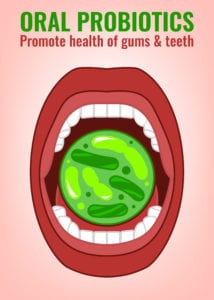 Article at a Glance
Article at a Glance
- Probiotics are good live bacteria and yeasts that help balance bacteria levels in the human body.
- Health benefits of probiotics include improving digestion, soothing skin conditions, fighting allergies and colds, and oral health.
- Many foods contain probiotics, but they can be ingested in supplements as well.
- New probiotic mouthwashes and toothpastes are being marketed as a way to remove bad bacteria without harming the good bacteria in your mouth.
You’ve probably heard about probiotics in milk and yogurt products. Many companies who sell dairy products are touting the benefits of probiotics, but they don’t talk about what they are or why they’re important. The truth is, probiotics may have more benefits than you realize.
Read more: Keeping your tongue healthy
What Are Probiotics?
Basically, probiotics are good live bacteria and yeasts. Probiotics are helpful, primarily in terms of digestion because they help with gut health. They can be found in supplements and certain foods. There are two primary types of bacteria that have been identified as helpful to humans.
- Lactobacillus is commonly found in fermented foods like yogurt. It can help ease diarrhea and digestion of lactose.
- Bifidobacterium is usually found in dairy products and is known to reduce symptoms of inflammatory digestive conditions.
How do Probiotics Work?
Science is still trying to identify specifically how probiotics work, but scientists identified two ways they can help. Your body is loaded with good and bad bacteria.
- When the balance of good and bad bacteria is disrupted, probiotics can help you get back on track.
- If you’ve lost good bacteria, like after taking antibiotics, your doctor may suggest probiotics to correct the loss.
What Are the Health Benefits of Probiotics?
The health benefits of probiotics extend beyond the digestive system. Some people are using probiotics for other conditions that are linked to bacteria levels in the body.
- Skin conditions, like eczema, have been shown to improve with probiotics.
- Some studies have been done that have found a link between probiotics and improvement in some mental health symptoms.
- There is research to show probiotics can lower LDL (bad cholesterol) and blood pressure for improved heart health.
- Probiotics may help you fight allergies and colds by improving your immune system and reducing inflammation.
- Using probiotics for oral health can help prevent plaque, fight bad breath and oral cancer, and soothe inflamed gums.
What Products Contain Probiotics?
Many foods have probiotics in them because they’re fermented or enriched in some way. You’ve probably heard or seen commercials for yogurts containing probiotics or specific forms or probiotics. This can be a major selling point for some brands, but there are plenty of other foods that contain probiotics.
- Milk
- Soft cheese
- Miso
- Sauerkraut
- Sourdough breads
You can also take supplements in the form of tablets, capsules, or powders. Some oral health products contain probiotics like mouthwash and toothpaste. Probiotic mouthwash has been shown to be effective in preventing plaque buildup. Some companies have even introduced probiotic toothpaste to rid your mouth of bad bacteria while preserving good bacteria.
Are There Side Effects from Probiotics?
Good bacteria is generally considered safe because it’s already in the human body. For most people, this is true and ingesting probiotics will have little to no effect. However, there can be some side effects to taking probiotics.
- For the first few days after starting probiotics, you may have an upset stomach, diarrhea, gas, or bloating.
- Some people can have an allergic reaction with more severe digestive responses to the probiotics.
- People who have problems with their immune system, those who have had surgery recently, and those who are extremely ill should avoid probiotics because they could trigger other issues or infections.
Read more: Removing Plaque from Your Teeth
Should I Use Probiotics for Oral Health?
There is no magic pill for good oral health. Brushing and flossing daily, eating right, and visiting your dentist every six months are the best ways to keep your smile healthy. However, probiotics may be an extra line of protection and prevention. Probiotics have been shown to prevent gum issues by tackling the bad bacteria in your mouth, reducing plaque buildup, and even improving bad breath.
If you’re considering taking probiotics for oral health, it’s a good idea to talk with your dentist and physician first. Jefferson Dental Care can answer your questions and help you make the best decision for you. Contact the office nearest you to make an appointment.



